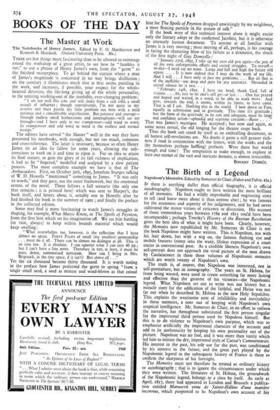BOOKS OF THE DAY
The Master at Work
THERE are few things more fascinating than to be allowed to rummage round the workshop of a great artist, to see how he " fumbles it out," to use a phrase of Henry James's own, from the " germ " to the finished masterpiece. To go behind the curtain where a man of James's magnitude is concerned in no way brings disillusion ; on the contrary it illuminates much that at first seems puzzling in the work, and increases, if possible, your respect for the whole- hearted devotion, the life-long giving up of the whole personality, to the untiring working-out of the insoluble, ever-changing problem : " I am not well this a.m. and still shaky from a sick cold, a small assault of influenza ; though convalescent, I'm not quite in my assiette and must puzzle my little problem out here with a mild patience and a considerable imperfection. But patience and courage— through endless small botherations and interruptions—will see me through—and I have only to me cramponner—add word to word. Se cramponner and add word to word is the endless and eternal receipt." The editors have served' the Master" well in the way they have presented his notebooks, with enough, but not too much, comment and cross-reference. The latter is necessary, because so often Henry James let an idea lie fallow for some years, allowing the sub- conscious to work on it and time to ripen it. For an idea to attain its final stature, to gain the glory of its full richness of implication, it had to be " fingered," modelled and sculpted by a slow patient process. The most complete example we have is that of The Ambassadors. First, on October 3oth, 1895, Jonathan Sturges talking of W. D. Howells " mentioned " something to James. " It was only to words," and they gave, not the outer framework, but the emotional centre, of the novel. There follows a full scenario (the only one that remains ; it is printed here) which was sent to Harper's, the book itself, and letters about it, notably one to Howells after he had finished the book in the summer of 1901 ; and finally the preface in the collected edition.
Some may find it more fascinating to watch James's struggles in shaping, for example, What Maisie Knew, or The Spoils of Poynton, from the first hint which set his imagination off. We see him battling (in vain, always) to keep within bounds material which would keep swelling :
" What overwhelms me, however, is the reflection that I have
almost no space. FORTY PAGES of small (my smallest) penmanship . . . must do it all. There can be almost no dialogue at all. This is an iron law. It is absolute. I can squeeze what I can into 40 pp.; but I can't have a line more. Therefore in Km, at least, it must be pure, dense, summarised narration. How can I bring in Mrs. Brigstock, in the tiny space, if it isn't? But above all ..."
Yet the six thousand became thirty thousand. It is worth noting in the preface how James preferred the germ to spring " from a single small seed, a seed as minute and wind-blown as that casual
hint for The Spoils of Poynton dropped unwittingly by my neighbour, a mere floating particle in the stream of talk."
If the book were of this technical interest alone it might excite only the literary adept or the confirmed Jacobite, but it is otherwise an intensely human document. To anyone at all familiar with James it is very moving ; most moving of all, perhaps, is his courage in facing the shattering blow of his failure as a dramatist, the shock of the first night of Guy Domville :
"lanuary 23rd, 1895, I take up my own old pen again—the pen of all my own unforgettable efforts and sacred struggles. To myself- to-day—I need say no more. Large and full and high the future still opens. . . . It is now indeed that I may do the work of my life. And I will . I have only to face my problems. . . . But all that is of the ineffable—too deep and pure for any utterance. Shrouded in sacred silence let it rest. . . .
"February 14th, 1895. I have my head, thank God, full of visions. .. . Ah, just to let one's self go—at last. . . . One has prayed and hoped and waited, in a word, to be able to work more. And now, towards the 'end, it seems, within its limits, to have come. That is all I ask. Nothing else in the world. I bow down to Fate, equally in submission and in gratitude. This time it's gratitude ; but the form of the gratitude, to be real and adequate, must be large and confident action—splendid and supreme creation.—Basta . . . ." That was James's mystique. He accepted; but now and again, as
some notes reveal, the old longing for the theatre crept back. Thus the book can stand by itself as an enthralling document, as all honest self-revelations are. No doubt it gains a still greater rich- ness if read in conjunction with the letters, with the works and the (by themselves perhaps baffling) prefaces. Were there but world enough and time! The temptation to make enough, to explore at least one corner of the vast and intricate domain, is almost irresistible.
BONAMY DOBREE.


































 Previous page
Previous page